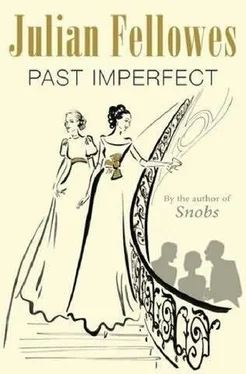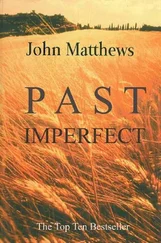Julian Fellowes - Past Imperfect
Здесь есть возможность читать онлайн «Julian Fellowes - Past Imperfect» весь текст электронной книги совершенно бесплатно (целиком полную версию без сокращений). В некоторых случаях можно слушать аудио, скачать через торрент в формате fb2 и присутствует краткое содержание. Жанр: Современная проза, на английском языке. Описание произведения, (предисловие) а так же отзывы посетителей доступны на портале библиотеки ЛибКат.
- Название:Past Imperfect
- Автор:
- Жанр:
- Год:неизвестен
- ISBN:нет данных
- Рейтинг книги:3 / 5. Голосов: 1
-
Избранное:Добавить в избранное
- Отзывы:
-
Ваша оценка:
- 60
- 1
- 2
- 3
- 4
- 5
Past Imperfect: краткое содержание, описание и аннотация
Предлагаем к чтению аннотацию, описание, краткое содержание или предисловие (зависит от того, что написал сам автор книги «Past Imperfect»). Если вы не нашли необходимую информацию о книге — напишите в комментариях, мы постараемся отыскать её.
Past Imperfect — читать онлайн бесплатно полную книгу (весь текст) целиком
Ниже представлен текст книги, разбитый по страницам. Система сохранения места последней прочитанной страницы, позволяет с удобством читать онлайн бесплатно книгу «Past Imperfect», без необходимости каждый раз заново искать на чём Вы остановились. Поставьте закладку, и сможете в любой момент перейти на страницу, на которой закончили чтение.
Интервал:
Закладка:
‘It all sounds quite advanced to me. Have you found a job already?’
‘I fixed it before I left Cambridge.’ He mentioned some dizzying, American bank. ‘They were recruiting and… they recruited me.’ I was suitably awestruck. One thing I have learned in life: Those who get to the top tend to start at the top. ‘I begin at the end of August,’ he said.
‘So do I, but I suspect in less style.’ I explained about my lowly job as whipping boy in the magazine offices. We fell silent. I suspect that for both of us the exchange had only served to underline the extent to which we had lost touch while still at university. Damian had not only dropped out of the Season, but also out of my life, and I don’t believe I had fully appreciated it before that moment.
I explained the reason for my call. ‘I don’t know.’ He didn’t sound keen.
‘I told Candida I thought you might have had enough of us.’
‘I always liked Candida.’ I was quite surprised by this. I never took notice of their friendship at the time, but then, how much had I noticed? Although I couldn’t help feeling that if Candida had known how she was remembered she would have rung him directly and not bothered with me. He spoke again. ‘OK. Why not? After paying my deposit here and buying the clothes I need to work in I haven’t a penny left, so there’s no chance of any other holiday this year.’
‘My position entirely.’ I was a little surprised by his acceptance, maybe, but on the whole pleased. It seemed to offer an opportunity to take us past the slightly odd end to our friendship and to give us the chance to go our separate ways after the summer more peacefully.
‘Did you go to the wedding?’ he said.
I’d wondered how long it would take him to ask. ‘Yes.’
‘I didn’t.’
‘I know.’
‘I was asked.’ He needed me to hear that his absence had been his choice, not hers. ‘Have you seen the baby?’
‘Once. She’s the image of Andrew.’
‘Lucky girl.’ He snorted derisively, trying to make a joke out of the sorrow we shared but did not admit. ‘Right. Send me the arrangements when you’ve got them and I will see you in the sun.’ The conversation was over.
The villa, when we arrived, was on the coast, wedged between Estoril and Cascais. I dare say it is much more built up now but then, thirty-eight years ago, there were only rocks below its terrace, leading directly to a wide and glorious, sandy beach and, beyond it, the sea. It couldn’t really have been better. The house was built, along with two or three others stretching along the coast in those pre-planning days, during the 1950s and it consisted of a large, main room – one cannot call it a drawing room, full as it was of rattan furniture and the like – as well as a dining room/hall, which took up the whole of the entrance front, with a mass of kitchens behind. These we hardly penetrated, since they were full of busy, Portuguese women who always looked cross whenever we went in. The bedrooms were arranged on two floors, ground and first, in a long wing that stretched away from behind the main block at a right angle. Each room had its own bathroom and high French windows opening, upstairs on to a balcony with an outside staircase leading down, and on the ground floor directly on to a wide, balustraded terrace overlooking the sea.
Our host was a genial fellow, John Dalrymple, something of an egghead who would later play a role in Mrs Thatcher’s government, but I never knew what, exactly. Given his straightness, his girlfriend was a little unlikely, a neurotic, American blonde with snuffles, complaining constantly of a sore throat. Her name was Alicky, which I assume was a shortening of Alexandra, although that was not confirmed. I remember her better than I might have, because she was the first person I knew to be in a permanent state about the poisons being put into our food by the government and how the whole world was about to implode. At the time we thought her a five-star whacko, but looking back, I suppose in a way she was ahead of her time. It was she who had decided that for reasons of security, although few people thought like that in those days, the girls would sleep upstairs and the boys down below, giving us the advantage of the French windows that opened on to the terrace and the wonderful view of the sea. My bedroom, at the far end of the wing, had that familiar, clean, sea-smelling feeling, with the pale tiled floor, the wicker furniture, the white covers and curtains, that always tells you this is a summer place. I sometimes wonder why attempts to reproduce this room back in England are invariably a failure. Probably because it does not work in the northern light.
I had flown in on the same ’plane as Candida, Dagmar and Lucy, but in the event, Damian had not travelled with us. He was already there and in his room, changing, when we arrived so we all set off to do the same. The Tremaynes had been staying in Paris and had driven across Spain in order to continue their holiday for nothing. They too were recovering in private, which meant that it was not until we all gathered on the terrace an hour or two later, the girls in their splendid, summer colours, me in my underwhelming, Englishman’s ‘summer casual wear,’ which always makes us look as if we’re aching to get back into a suit (which most of us are), that the party finally assembled, and it was a very nice way to begin. John had arranged for us all to be given glasses of champagne, while he explained the plan for the first evening, which was for the whole party to jump into cars and head for the Moorish ruins at Cintra, a little way along the coast, and have a picnic dinner there. It seemed a very appropriate, opening adventure.
Cintra is a magical place, or it was then. I have not seen it since. At some point in the nineteenth century a presumably unbalanced Bragança king had built a huge, turreted castle on the hilltop, more suited to Count Dracula than a constitutional monarchy, while a little way beyond, making the place even more special and strange and complementing the Disneyesque splendours of the Royal palace, there was a long extended ruin of a fortified, Moorish stronghold, running from hill to hill, which had been abandoned by the retreating hordes during the Middle Ages. On that summer night this pair of monuments to two forgotten empires made richly cinematic outlines against the sky, as the sun sank in the west.
What I had gathered since our arrival was that John Dalrymple was very bored in his posting, though whether this was the bank’s fault or, more probably, because of his choice of romantic companion I could not say. Either way, he was only too delighted to have some people to entertain. He and Candida seemed to go back quite far, though as friends not lovers, and it was clear from this, our first ‘moment’ of the stay, that nothing was too much trouble. A table had been set up beneath the castle walls among some trees – Olives, perhaps? I picture them in my mind as twisted and scraggy, seemingly clinging to life in the dusty soil. Candle lanterns had been hung among the rather threadbare branches, and rugs and cushions strewn about, making the whole thing into the feast of some Arab emperor. We took our drinks and walked about among the outskirts of the ruins, where stray blocks and lumps of stone had rolled over the centuries. The Tremaynes were there, a little improved, I thought, from when I’d known them, poised as they were on the brink of City careers that had been conjured up out of nothing by some friends of their papa, and they were hovering attentively round Dagmar. Lucy was talking to Alicky and John.
A little way away, Damian walked arm in arm with Candida. When I glanced across at them, with a sinking heart I could see a trace of her terrifying, Gorgon-like, flirtatious manner beginning to surface. He made some no doubt blameless remark, which was greeted by her roar of a laugh, which made everyone look up to see her eyes rolling in her head in what I suspect she thought a beguiling and intriguing way. As usual, when it came to matters of this kind, her taste let her down. Damian began to give telltale glances to anyone who’d pick them up, seeking an escape route. Even so, it seemed very peaceful, as if we were all in the right place at the right time. Which would prove quite ironic before we were finished. At that moment a bell was rung, announcing that we were to help ourselves to the first course, so we drifted up to the table, and, laden with plates, glasses and all the rest of the paraphernalia, we found our way over to the cushions. Lucy plonked down next to me. ‘What are you up to now?’ I asked. I hadn’t heard much about many of the girls and nothing at all of her.
Читать дальшеИнтервал:
Закладка:
Похожие книги на «Past Imperfect»
Представляем Вашему вниманию похожие книги на «Past Imperfect» списком для выбора. Мы отобрали схожую по названию и смыслу литературу в надежде предоставить читателям больше вариантов отыскать новые, интересные, ещё непрочитанные произведения.
Обсуждение, отзывы о книге «Past Imperfect» и просто собственные мнения читателей. Оставьте ваши комментарии, напишите, что Вы думаете о произведении, его смысле или главных героях. Укажите что конкретно понравилось, а что нет, и почему Вы так считаете.












